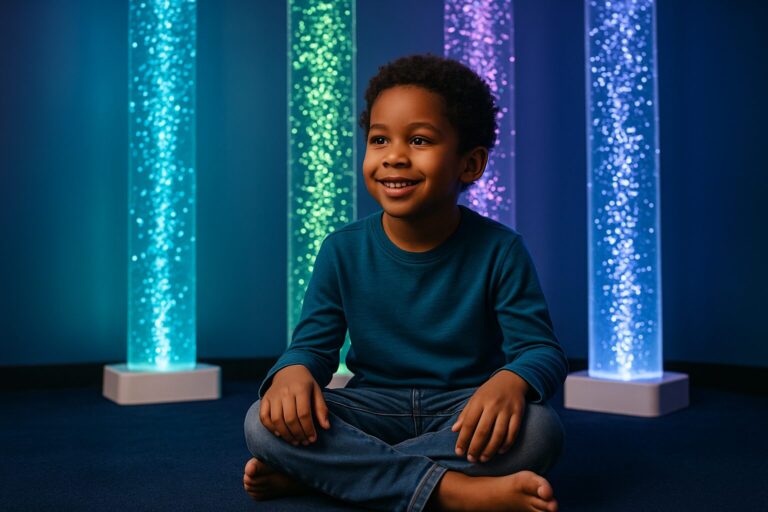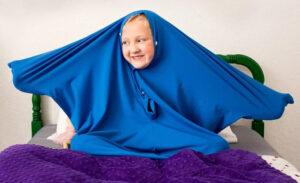Sensory lamps—including LED color-changing lights, fiber optic lamps, and bubble tubes—offer calming visual stimulation that supports emotional regulation, focus, and sensory integration. These tools help reduce sensory overload and can be a beautiful addition to any sensory room or calm-down corner.
🔍 Why Sensory Lamps Help with Sensory Processing
- Flicker-free and consistent lighting: LED lighting offers stable visual input, helping children avoid overstimulation.
- Customizable colors and brightness: Lamps with color and brightness options allow parents to tailor the environment to their child’s needs.
- Soothing visual movement: Lamps with bubbles, fading colors, or fiber optic strands promote relaxation and visual focus.
- Mood and emotional support: Calm lighting supports transitions like bedtime, decompression time, and therapy sessions.
🎨 How to Use Sensory Lamps
- Start with warm tones (like soft orange or green) to promote calm.
- Use sensory lamps as part of a calm-down corner, bedroom routine, or therapy station.
- Allow children to choose their favorite color or brightness setting when possible.
- Pair lamps with weighted blankets, fidget tools, or music for a multi-sensory setup.
🛒 Top 3 Sensory Lamps for Autistic Children
⭐ LED Color‑Changing Mood Lamp
Best for: Adjustable hues and quiet bedtime lighting
This lamp allows full control of brightness and color, making it ideal for creating relaxing atmospheres for bedtime or sensory breaks. It’s compact, portable, and great for travel or bedrooms.
🌈 Fiber Optic Glow Lamp
Best for: Visual sensory engagement
This glowing lamp features dozens of fiber optic strands that shift colors slowly, offering visual stimulation in a non-overwhelming way. Great for visual seekers or calming bedtime routines.
💧 5ft Bubble Tube Table Lamp
Best for: Visual focus and sensory room ambiance
This classic sensory lamp features floating bubbles and cycling LED lights, great for creating a peaceful atmosphere. Its rhythmic motion draws attention and supports calm behavior.
🧠 Activity Ideas Using Sensory Lamps
- Color-matching game: Ask your child to find a toy or object that matches the lamp’s color.
- Breathing with light: Use slow fading light patterns to guide deep breathing exercises.
- Drawing shadows: Place toys in front of the lamp and trace the shadows to build visual-motor skills.
🙋♀️ Frequently Asked Questions
Are sensory lamps safe for autistic children?
Yes. Most sensory lamps use LED lighting that stays cool and safe to touch. Be sure to supervise cords and use age-appropriate designs.
Can sensory lamps help with meltdowns?
Yes. Gentle lighting can reduce stimulation and help children transition into a calm state during sensory overload or anxiety episodes.
What kind of sensory lamp is best for my child?
It depends on your child’s preferences. Visual seekers may love fiber optics or bubble tubes, while light-sensitive children may prefer soft color-changing lamps with low brightness settings.
As an Amazon Associate, SensoryGift.com earns from qualifying purchases. Thank you for supporting sensory accessibility and care for all kids.



